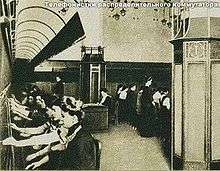Moscow City Telephone Network
The Moscow City Telephone Network (Russian: Московская городская телефонная сеть Moskovskaya Gorodskaya Telefonnaya Set') is a publicly held utility providing local telephone service to over 4,000,000 subscribers in the city of Moscow, Russia. Its Latin acronym is MGTS.
 | |
| Joint stock | |
| Traded as | MCX: MGTS |
| Industry | Telecommunications |
| Founded | July 13, 1882 |
| Headquarters | Moscow |
| Products | Mobile Telephony |
| Parent | Sistema |
| Website | http://www.mgts.ru/ |
History

| Wikimedia Commons has media related to MGTS. |
Founded in 1882, the network has a long and glorious history. The Bell Telephone Company built a manually operated exchange with a capacity of 800 numbers and 26 households signed up. In two years the roll had increased to 3,000.
In 1891, the Swedish-Danish-Russian Joint-Stock Company signed a contract to provide service to Moscow for 18 years. Progress continued apace. In 1987 the network was converted to electronic switching.
In 1994 the Moscow City Telephone Network was structured into a joint stock company. A majority stake is held by Mobile TeleSystems.
On November 2013 it was reported that the company chose four suppliers of main and distribution of fiber optic cables for the development of optical fiber cables network until 2016 volume of purchases made more than 1 billion rubles. Earlier that month the company announced rebranding and new positioning of the company as a multi-service operator, to create a single digital platform of Moscow. In 2014, the operator will complete the construction of digital technology platform based on fiber networks to buildings (FTTx) and will provide all users access to a package of services, including broadband Internet access (broadband), digital TV and telephony. By late 2013 The company has built about 25 thousand kilometers connecting 650,000 households in Moscow.[1]
On January 2014 it was reported that the Moscow Government plans to revoke MGTS monopoly on public telephones, which the company had since 1994, and to select new operator that will add a completely new device features, such as parking fees payment option.[2]
References
- "GPON на четверых". comnews.ru. Retrieved 30 November 2013.
- "МГТС лишают монополии на таксофоны". comnews.ru. 21 January 2014.